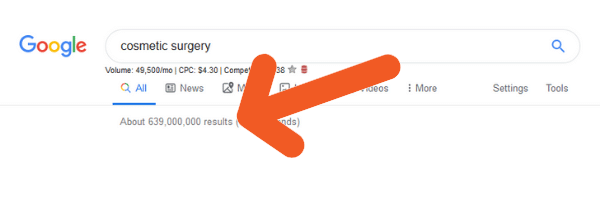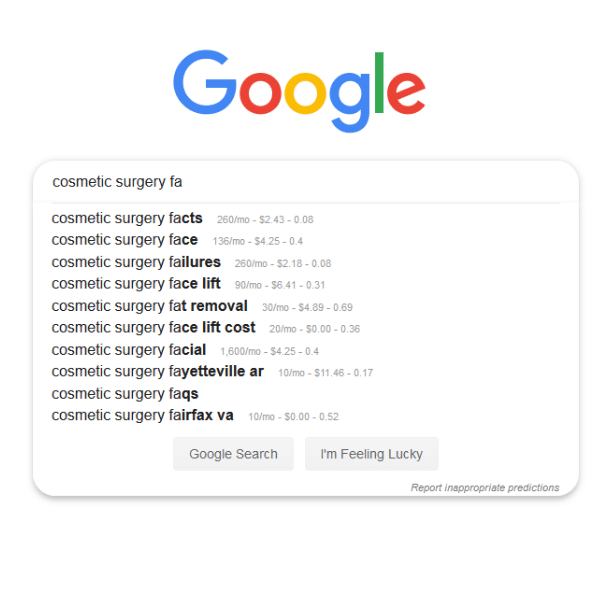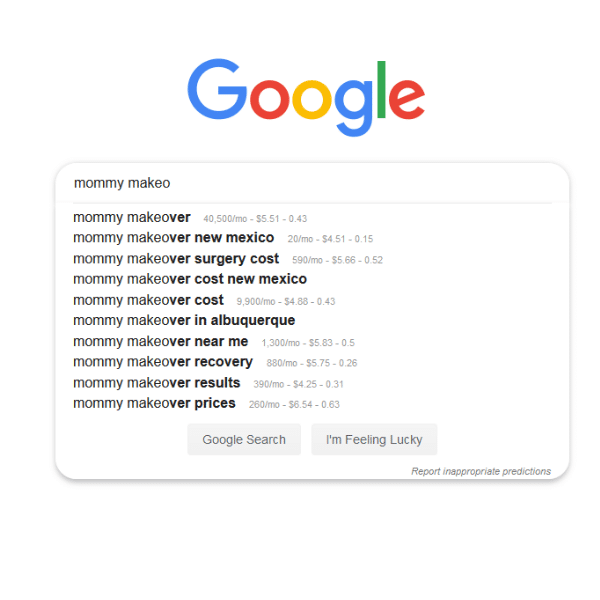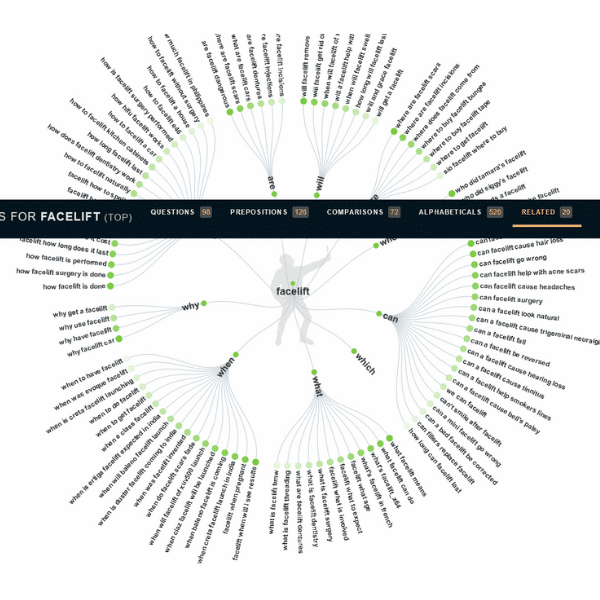To increase patient volume at your plastic surgery or dermatology practice, medspa, or aesthetics business, you should take advantage of longtail keywords. As I discussed in Chapter Two of my free ebook, 7 Deadly Sins of Healthcare Content Writing that Kill SEO and Turn Off Prospective Clients, longtail keywords are the long search phrases people type into Google or other search engines to find what they’re looking for. Today, let’s talk about how this search strategy can help you.
Why longtail keywords?
If your site is optimized for a primary keyword like “cosmetic surgery,” great! But be aware that so are over 600 million other websites (according to Google), which makes it hard for your website to obtain a high search ranking.

On the other hand, longtail keywords – those three-to-five-word phrases people search for – are much more specific and can be easier to rank for because fewer other websites compete for them. An example might be “cosmetic surgery facelift cost.” As you can see from this screenshot, very few people search on this particular phrase, which makes it easy for your practice’s website to land first in the search results.

This makes no sense
For many clinicians, including plastic surgeons, the idea of trying to achieve great search engine ranking for a low-volume keyphrase seems counterintuitive. Why put effort into achieving great search rank for a term only around 20 people per month search for?
There are a number of reasons, actually, but I think the folks at Wordtracker make the best point when they write:
You see, whenever a customer uses a highly specific search phrase, they tend to be looking for exactly what they are actually going to buy. In virtually every case, such very specific searches are far more likely to convert to sales than general generic searches that tend to be geared more toward the type of research that consumers typically do prior to making a buying decision.
Other reasons you should develop a longtail keyword strategy include:
- Longtail keywords account for 70% of all web searches
- Longtail keywords usually reiterate your primary keywords (e.g.: “cosmetic surgery”)
- Longer search phrases account for roughly one-third of all web searches
How to find longtail keywords for your plastic surgery practice
Now that we’ve established that longtail keywords represent prospective clients who are closer to the purchase point than others, how can you discover what three-to-five-word phrases your prospective patients actually search for?
You’re going to be shocked by how easy it is. Not to mention it’s free.
Start by simply using Google’s search suggestions that pop up when you type something into the search engine box:

Here you can see that approximately 40,500 women per month search for the generic term “mommy makeover,” but only about 20 per month search with geographic specificity: “mommy makeover New Mexico.”
This particular search yields some additional interesting information. Around 600 people per month search for the term “mommy makeover surgery cost,” while only about 260 search for “mommy makeover prices.” This means you can gain a competitive advantage by creating two separate pages on your website that discuss the financial investment required for a mommy makeover: one page optimized for the term that includes “price” and other for “cost.” You may find you can rank first for the less-competitive keyword “price,” while your competitors slug it out to rank first for “cost.”
Tools for identifying plastic surgery longtail keywords
Using only the Google search box to perform keyword research isn’t adequate, however. To dig deeper, try using any of these free tools to generate keywords related to your primary search terms:
- Google Trends – Again somewhat limited usefulness, but not a bad place to start.
- Keywords Everywhere – A free browser add-on for Chrome and Firefox, which I use, myself, to quickly identify related longtail keywords.
- Ubersuggest – A free tool developed by marketing guru Neil Patel.
- Answer the Public – A free tool that aggregates search queries based on the term you type in – and then displays the results in a beautiful data visualization, like this:

Will these free tools enable you to become an SEO master overnight? Probably not. There’s a reason why SEO agencies for plastic surgery pay for sophisticated research tools. But for the small- to mid-sized plastic surgery practice that wants or needs to compete better on the web, the tools I’ve shared above will at least get you started.
And if researching keywords and writing web pages (or incorporating those longtails into your blog posts) isn’t your thing, then let’s talk. I’m happy to help!
For more great tips on how to craft plastic surgery content that pleases both Googlebot and your human readers, please subscribe to our weekly blog posts.

